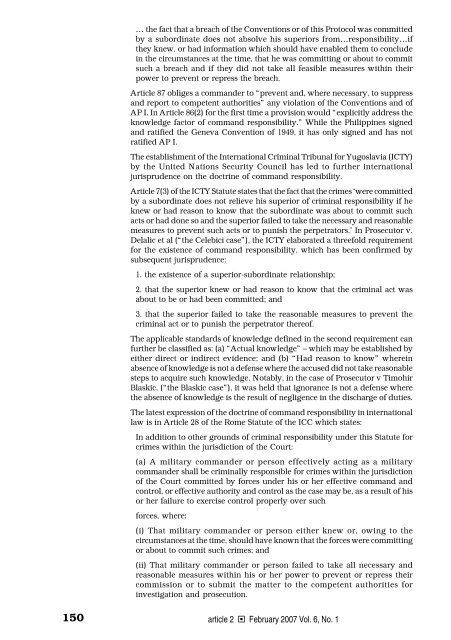of the Philippines the criminal justice system is - Article 2
of the Philippines the criminal justice system is - Article 2
of the Philippines the criminal justice system is - Article 2
Create successful ePaper yourself
Turn your PDF publications into a flip-book with our unique Google optimized e-Paper software.
… <strong>the</strong> fact that a breach <strong>of</strong> <strong>the</strong> Conventions or <strong>of</strong> th<strong>is</strong> Protocol was committed<br />
by a subordinate does not absolve h<strong>is</strong> superiors from…responsibility…if<br />
<strong>the</strong>y knew, or had information which should have enabled <strong>the</strong>m to conclude<br />
in <strong>the</strong> circumstances at <strong>the</strong> time, that he was committing or about to commit<br />
such a breach and if <strong>the</strong>y did not take all feasible measures within <strong>the</strong>ir<br />
power to prevent or repress <strong>the</strong> breach.<br />
<strong>Article</strong> 87 obliges a commander to “prevent and, where necessary, to suppress<br />
and report to competent authorities” any violation <strong>of</strong> <strong>the</strong> Conventions and <strong>of</strong><br />
AP I. In <strong>Article</strong> 86(2) for <strong>the</strong> first time a prov<strong>is</strong>ion would “explicitly address <strong>the</strong><br />
knowledge factor <strong>of</strong> command responsibility.” While <strong>the</strong> <strong>Philippines</strong> signed<br />
and ratified <strong>the</strong> Geneva Convention <strong>of</strong> 1949, it has only signed and has not<br />
ratified AP I.<br />
The establ<strong>is</strong>hment <strong>of</strong> <strong>the</strong> International Criminal Tribunal for Yugoslavia (ICTY)<br />
by <strong>the</strong> United Nations Security Council has led to fur<strong>the</strong>r international<br />
jur<strong>is</strong>prudence on <strong>the</strong> doctrine <strong>of</strong> command responsibility.<br />
<strong>Article</strong> 7(3) <strong>of</strong> <strong>the</strong> ICTY Statute states that <strong>the</strong> fact that <strong>the</strong> crimes ‘were committed<br />
by a subordinate does not relieve h<strong>is</strong> superior <strong>of</strong> <strong>criminal</strong> responsibility if he<br />
knew or had reason to know that <strong>the</strong> subordinate was about to commit such<br />
acts or had done so and <strong>the</strong> superior failed to take <strong>the</strong> necessary and reasonable<br />
measures to prevent such acts or to pun<strong>is</strong>h <strong>the</strong> perpetrators.’ In Prosecutor v.<br />
Delalic et al (“<strong>the</strong> Celebici case”), <strong>the</strong> ICTY elaborated a threefold requirement<br />
for <strong>the</strong> ex<strong>is</strong>tence <strong>of</strong> command responsibility, which has been confirmed by<br />
subsequent jur<strong>is</strong>prudence:<br />
1. <strong>the</strong> ex<strong>is</strong>tence <strong>of</strong> a superior-subordinate relationship;<br />
2. that <strong>the</strong> superior knew or had reason to know that <strong>the</strong> <strong>criminal</strong> act was<br />
about to be or had been committed; and<br />
3. that <strong>the</strong> superior failed to take <strong>the</strong> reasonable measures to prevent <strong>the</strong><br />
<strong>criminal</strong> act or to pun<strong>is</strong>h <strong>the</strong> perpetrator <strong>the</strong>re<strong>of</strong>.<br />
The applicable standards <strong>of</strong> knowledge defined in <strong>the</strong> second requirement can<br />
fur<strong>the</strong>r be classified as: (a) “Actual knowledge” – which may be establ<strong>is</strong>hed by<br />
ei<strong>the</strong>r direct or indirect evidence; and (b) “Had reason to know” wherein<br />
absence <strong>of</strong> knowledge <strong>is</strong> not a defense where <strong>the</strong> accused did not take reasonable<br />
steps to acquire such knowledge. Notably, in <strong>the</strong> case <strong>of</strong> Prosecutor v Timohir<br />
Blaskic, (“<strong>the</strong> Blaskic case”), it was held that ignorance <strong>is</strong> not a defense where<br />
<strong>the</strong> absence <strong>of</strong> knowledge <strong>is</strong> <strong>the</strong> result <strong>of</strong> negligence in <strong>the</strong> d<strong>is</strong>charge <strong>of</strong> duties.<br />
The latest expression <strong>of</strong> <strong>the</strong> doctrine <strong>of</strong> command responsibility in international<br />
law <strong>is</strong> in <strong>Article</strong> 28 <strong>of</strong> <strong>the</strong> Rome Statute <strong>of</strong> <strong>the</strong> ICC which states:<br />
In addition to o<strong>the</strong>r grounds <strong>of</strong> <strong>criminal</strong> responsibility under th<strong>is</strong> Statute for<br />
crimes within <strong>the</strong> jur<strong>is</strong>diction <strong>of</strong> <strong>the</strong> Court:<br />
(a) A military commander or person effectively acting as a military<br />
commander shall be <strong>criminal</strong>ly responsible for crimes within <strong>the</strong> jur<strong>is</strong>diction<br />
<strong>of</strong> <strong>the</strong> Court committed by forces under h<strong>is</strong> or her effective command and<br />
control, or effective authority and control as <strong>the</strong> case may be, as a result <strong>of</strong> h<strong>is</strong><br />
or her failure to exerc<strong>is</strong>e control properly over such<br />
forces, where:<br />
(i) That military commander or person ei<strong>the</strong>r knew or, owing to <strong>the</strong><br />
circumstances at <strong>the</strong> time, should have known that <strong>the</strong> forces were committing<br />
or about to commit such crimes; and<br />
(ii) That military commander or person failed to take all necessary and<br />
reasonable measures within h<strong>is</strong> or her power to prevent or repress <strong>the</strong>ir<br />
comm<strong>is</strong>sion or to submit <strong>the</strong> matter to <strong>the</strong> competent authorities for<br />
investigation and prosecution.<br />
150<br />
article 2 • February 2007 Vol. 6, No. 1

















